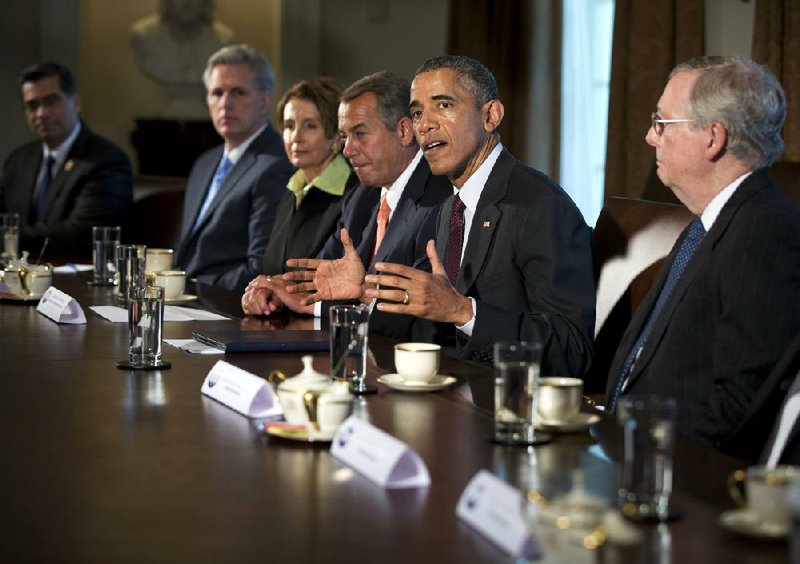WASHINGTON -- President Barack Obama and Republican congressional leaders gave no ground on their differences, including on the Keystone XL pipeline and immigration, even as they pledged to find common ground over the next year.
Obama met at the White House on Tuesday with congressional leaders from both parties.
With Republicans now in control of the House and Senate, the president has issued five veto threats since the beginning of the year.
"There was some suggestion made that it would be helpful if the president didn't threaten vetoes so early on in the process," Sen. John Thune, the chamber's third-ranking Republican, said. "But unfortunately, he's pretty dug in on some of those issues."
Among them is legislation moving through Congress that would bypass the administration's review of TransCanada Corp.'s proposal to build the Keystone oil pipeline. Thune said Obama gave no sign of backing off his vow to veto the bill.
In brief remarks to reporters before the meeting began, Obama focused on several areas where he and congressional Republicans have some common interests, ticking off a list of priorities including enhancing cybersecurity, boosting trade, reworking the tax code and streamlining government.
"Obviously there are disagreements around the table on a whole range of issues, but there are also areas where we can agree, and that's where we're going to be focused," he said.
Republicans are advancing bills to approve Keystone, change the requirements for employer-provided insurance under Obama's health law, require more justification and notice of regulatory changes, alter a key provision of a Wall Street regulatory bill, and block Obama's action to end the deportation threat for up to 5 million illegal aliens. Obama has threatened to veto all of them.
On immigration, even some Republican senators were skeptical of the approach being taken in the House, where Republicans were using a $39.7 billion spending bill, which would keep the Homeland Security Department running past February, as the vehicle to overturn Obama's executive actions.
"Our response shouldn't be on the funding bill," said Sen. Jeff Flake, R-Ariz.
Some other House Republicans acknowledged that the Senate was likely to reject their approach, perhaps forcing them in the end to pass a homeland security funding bill stripped of the language on immigration.
But House Speaker John Boehner of Ohio said in a statement after the meeting with Obama that Republicans had no plans to pull back on their initiatives. Other Republicans also said they would not be cowed by the president's veto threats.
"I'm a member of Congress; I'm not a potted plant. I don't take my orders from the White House," said Rep. Charlie Dent, R-Pa., after Republicans met privately to discuss their strategy. "There's a new sheriff in the Senate, and so he's not going to have a compliant majority leader in the Senate who's going to bottle up and bury everything."
White House spokesman Josh Earnest faulted Republicans for "recycling old legislation that they know that the president strongly opposes."
One area where both sides said they may find agreement is bolstering computer and network security. Republican Senate Majority Leader Mitch McConnell of Kentucky also said he believes a bipartisan deal on trade is possible.
The president said at the beginning of the meeting that he wanted to focus on the economy, saying the latest jobs report "indicates that the recovery continues to move in a robust fashion."
"We're in a position to make sure that 2015 is an even stronger year," he said.
McConnell also said Obama is working on sending Congress a new authorization for the use of military force against the Islamic State extremist group, which has taken over large portions of Iraq and Syria.
The U.S. is part of a coalition that has used airstrikes to target the group. So far, the administration has relied on congressional authorizations that former President George W. Bush used to justify military action after the Sept. 11, 2001., terrorism attacks.
Obama will lay out his full agenda in next week's State of the Union speech and in the fiscal 2016 budget he is to release Feb. 2.
One of the top lawmakers missing from the meeting was Senate Minority Leader Harry Reid, a Nevada Democrat. He's still recovering from broken bones and a concussion after an accident while exercising. Reid, 75, sent his top lieutenant Richard Durbin, D-Ill., in his place.
Information for this article was contributed by Angela Greiling Keane, Mike Dorning, Billy House and Kathleen Hunter of Bloomberg News by Erica Werner, Matthew Daly, Marcy Gordon, Laurie Kellman, Donna Cassata, Julie Pace and staff members of The Associated Press.
A Section on 01/14/2015

